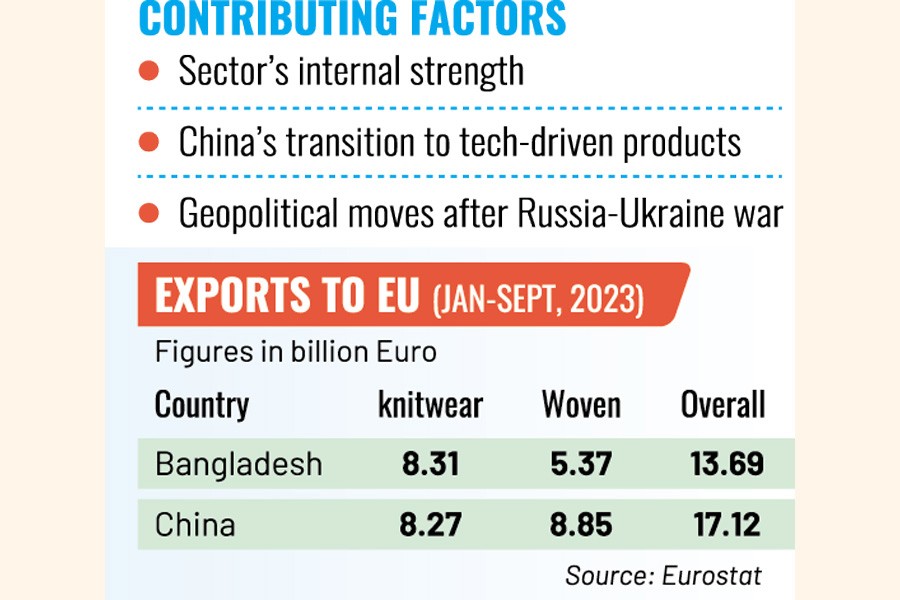Bangladesh surpassed China in knitwear exports to the European Union during the first nine months of this year.
The country shipped knit items worth 8.31 billion Euro during the January-September period, slightly higher than its main competitor China that shipped the same category of items worth 8.27 billion Euro, according to Eurostat data.
Local woven garments fetched 5.37 billion Euro while China bagged 8.85 billion Euro during the same period.
All major exporting countries, however, witnessed double digit negative growth during the period under review as the EU’s overall imports declined by 14.10 per cent to 63.51 billion Euro.
The EU imported garments worth 73.94 billion Euro during the corresponding period of last year.
Bangladesh’s overall RMG exports to its largest destination in the bloc stood at 13.69 billion Euro during the nine-month period, recording a 17.66 per cent fall from 16.62 billion Euro in the corresponding period of 2022.
China recorded a 20.17 per cent fall to 17.12 billion Euro while Turkey recorded a 12.67 per cent decline to 7.57 billion Euro during the period.
India earned 3.35 billion Euro marking a 10.37 per cent decrease while Vietnam fetched 2.81 billion Euro with 10.59 per cent negative growth, according to data.
When asked, former president of the Bangladesh Knitwear Manufacturers and Exporters Association (BKMEA) Fazlul Hoque said that it is ‘very good’ news thanks to the sector’s internal strength as reflected in the performance.
He said the duty-free benefit is one of the main reasons for Bangladesh’s exports to the EU increasing over the years.
Talking to the FE, Bangladesh Garment Manufacturers and Exporters Association (BGMEA) President Faruque Hassan said the overall RMG exports surpassed China last year in terms of quantity.
This is the first time that the knit sub-sector surpassed China in terms of value, he said, adding that considering the overall situation, Bangladesh is performing better compared to its competitor countries.
Despite the negative growth, Bangladesh’s share has been increasing gradually, he said, expecting that the trend might continue in the days ahead.
Regarding the negative growth, he said that it is not only a case of Bangladesh, but also of other countries due to global demand falling amid high inflation and bank interest rates induced by the Russia-Ukraine war.
Regarding the market share, Dr MA Razzaque, chairman of the Research and Policy Integration for Development (RAPID), said at a recent programme that many European countries are increasingly adopting the ‘China-plus-one’ policy to diversify their supply chains.
“Bangladesh can proactively engage in negotiations with these nations to secure a share of these expanding markets,” he mentioned.
China’s strategic transition towards producing more technology- intensive goods and geopolitical developments are prompting the Western buyers to diversify their sourcing, and it can be another boon for Bangladesh, he added.
As China’s market share diminishes, it opens avenues for other nations, including Bangladesh, to fill the gap, he further said.
Bangladesh holds a significant market share of 22.1 per cent after China holding 29.2 per cent of the EU’s market share in 2022.
China’s share in the EU market has been decreasing since 2010 while that of Bangladesh’s has been increasing gradually mainly because of the duty-free market there, according to experts.
SOURCE: CLICK HERE

